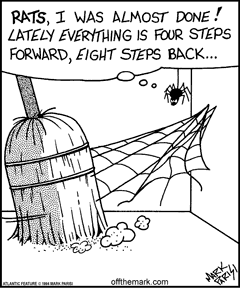When we confuse or frustrate a particular learned behavior it causes a reversion to an earlier learned behavior. This earlier learned behavior is typically less desirable, but comfortable and familiar.  This regression of sorts occurs when we are unable to accept and perform at an expected level. Regression is a defense mechanism and can be a short-lived detour before continuing forward progression.
This regression of sorts occurs when we are unable to accept and perform at an expected level. Regression is a defense mechanism and can be a short-lived detour before continuing forward progression.
Various forms of cognitive behavioral therapy are the best way to overcome regression as the catalyst is studied and analyzed so that it can be dealt with accordingly when encountered again. In other words, study the “enemy” to learn of its weaknesses in order to overcome it in the future.
As an example, say that you have a string of losing trades. If you’ve kept a detailed trading journal you can parse the data to better understand why the losses are occurring. If you’ve taken the time to add your feelings/emotions in addition to the trade data, your work will be that much easier. Look for where the regression occurred as it should stick out and be easily recognized. Why? Odds are good that the culprit is something you’ve done in the past in your market participation. Here are some good starter questions to ask yourself as you process the regression data: [list type=square_list]
- What was the overall trend in the market?
- What economic catalyst, if any, were released?
- Is there a geopolitical issue?
- Earnings?
- Trading larger than normal size?[/list]
Once you discover what (over-trading, trading in a trend-less market, lazy with homework) caused the regression your work has just begun. Finding out the why is key. Take a look at the time period leading up to the catalyst and see how your trading was. Perhaps a string of winning trades led to laziness. Find the why to truly understand.
“Everything that exists, exists in some degree and can be measured” – Edward L. Thorndike
